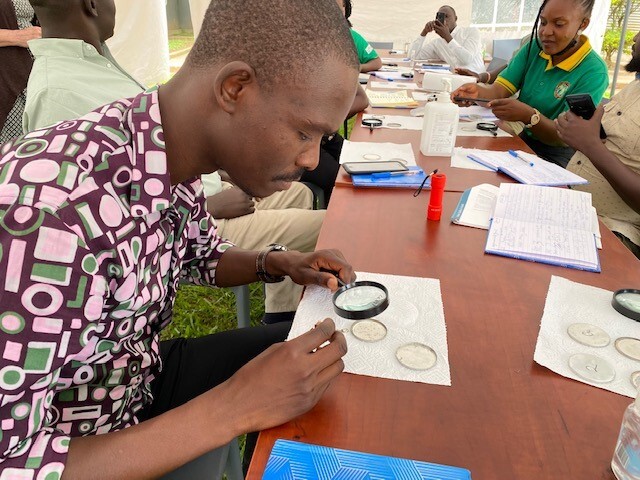New Report Unveils Critical Gaps in Rural Water Sector and Calls for Urgent Action
CHARLESTON, S.C., Oct. 01, 2024 (GLOBE NEWSWIRE) — Global Water Center (GWC), in collaboration with the Centre for Affordable Water and Sanitation Technology (CAWST) and the Rural Water Supply Network (RWSN), is proud to announce the release of the “Rural Water Capacity Needs Assessment” report. This comprehensive report, based on a thorough analysis of 280 responses, sheds light on the critical gaps and challenges in the rural water sector.
The majority of people without access to safe water live in rural areas, but there is limited data about the rural water workforce around the world. According to Lisa Mitchell, GWC’s Senior Director of Learning Services, “This report provides direction to organizations serving the rural water sector by highlighting key gaps within the rural workforce and what we need to do to address them.”

Jeremiah Ouko, trainer with Aqua Clara Kenya (CAWST training partner) counting colonies as part of an Introduction to Drinking Water Quality Workshop in Kampala, Uganda.
The report reveals significant competency gaps in water supply technologies and water quality and safety. It also highlights the barriers to building a sustainable rural water workforce, such as job scarcity, limited incentives, insufficient personnel, and inadequate materials. Another important finding is that the infrastructure/maintenance technician is the hardest position to fill.
“Key to solving the existing and emerging world’s water crisis is building the capacity of local water, sanitation, and hygiene workers. The findings of this report help focus attention on roles that need to be filled, or need additional skill development,” says Shauna Curry, CEO of CAWST. “By attracting talent and supporting others to be more effective in their work, together we can reach the scale of impact needed to reach the billions of people living without access to safely managed water and sanitation.”
To address these challenges, the report provides actionable recommendations focused on prioritizing the recruitment and development of rural water technicians, enhancing capacity development with a focus on workforce issues, and adopting interactive, peer-based learning approaches. The need for standardized job titles and responsibilities is also emphasized to streamline capacity development efforts across the sector.
This report marks a significant step forward in understanding and addressing the rural water sector’s capacity needs. According to Sean Furey, RWSN Secretariat Director, “The long-term success of rural water services hinges on the talent and passion of the people behind the pipes. Investing in human capital is the key to achieving inclusive rural water services. Skilled workers not only maintain critical infrastructure but also help adapt solutions to meet local needs to ensure that safe water reaches every household, no matter how remote. This important work spotlights some of the systematic challenges, but more importantly, shows us a way forward.”
GWC, CAWST, and RWSN are committed to taking action based on the report’s findings, and they call on other organizations to join in these efforts to improve the quality and sustainability of rural water services worldwide.
Read the full report: Rural Water Capacity Needs Assessment
About Global Water Center
Global Water Center believes everyone deserves access to safely managed water. Our three-pronged approach of education, innovation, and collaboration focuses on making rural water projects more sustainable. As the go-to resource for the rural water sector, our safe water resources have reached people in 131 countries. In addition to education, we also use innovative technology to make water projects more effective and reliable. All of our efforts are rooted in collaboration with non-profits, governments, and other entities. Together, we are solving the global water crisis.
About Centre for Affordable Water and Sanitation Technology (CAWST)
CAWST is a Canadian charity and licensed not-for-profit professional engineering consultancy. We teach people how to bring safe drinking water, sanitation and hygiene into their homes, schools and clinics, using simple, affordable technologies. CAWST transfers knowledge and skills to organizations and individuals in low- and middle-income countries through workshops, open content training resources and consulting services. To learn more about CAWST and our mission to make water knowledge common knowledge, visit cawst.org.
About Rural Water Supply Network (RWSN)
RWSN is professional knowledge network, with more that 15,000 members in 160 countries, that provides a convening space for individual professionals and organisations to share experiences, collaborate, develop guidelines and standards, curate knowledge, and promote lifelong learning in the rural water sector. RWSN’s vision is that of a world in which all people enjoy safely managed water services that are resilient and sustainable, and we look to improve the quality of rural water services and their management through our members and partners. RWSN also works to inspire and support more women to become active at all levels of decision-making.
Media Contact: Alyson Rockhold
Director of Global Engagement
Global Water Center
+1 346.273.9148 arockhold@globalwatercenter.org
A photo accompanying this announcement is available at https://www.globenewswire.com/NewsRoom/AttachmentNg/b65329fd-348c-419b-9a2d-fbda0efe1228

© 2024 Benzinga.com. Benzinga does not provide investment advice. All rights reserved.



Leave a Reply